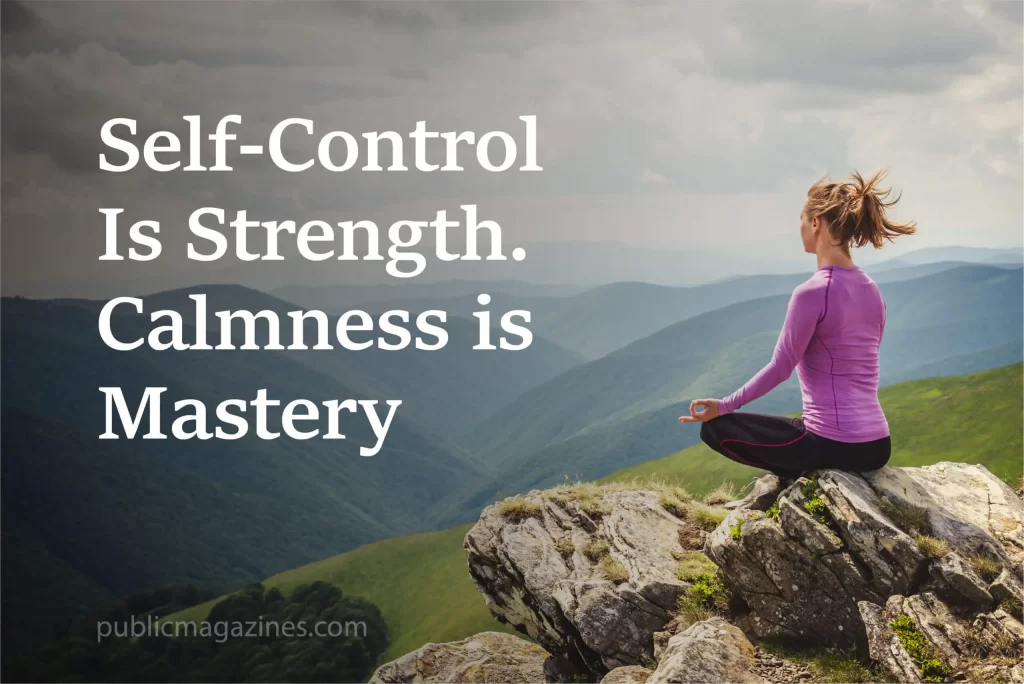In an increasingly chaotic world, the concepts of self-control and calmness have never been more pertinent. These attributes not only foster personal well-being but also significantly influence our professional and social lives. Inspired by the insights of Tymoff, a modern thinker in the realm of personal development, this article delves into the profound impact of self-control and calmness. We will explore how these traits constitute inner strength and mastery, providing practical tips on how to cultivate them and answering frequently asked questions to deepen our understanding.
Understanding Self-Control
What is Self-Control?
Self-control is the ability to regulate one’s emotions, thoughts, and behaviors in the face of temptations and impulses. It is a vital component of emotional intelligence, enabling individuals to pursue long-term goals despite short-term temptations. Self-control encompasses a range of behaviors, including delaying gratification, resisting harmful behaviors, and maintaining focus on priorities.
The Importance of Self-Control
- Personal Development: Self-control is crucial for personal growth. It allows individuals to stick to their commitments, develop healthy habits, and avoid detrimental behaviors. It empowers one to make decisions that align with their long-term goals rather than succumbing to fleeting desires.
- Professional Success: In the workplace, self-control translates to better time management, enhanced productivity, and the ability to navigate stressful situations calmly. It helps in maintaining professional relationships and making sound decisions under pressure.
- Social Relationships: Self-control is fundamental in maintaining healthy relationships. It enables individuals to communicate effectively, resolve conflicts amicably, and exhibit empathy and patience in interactions with others.
The Essence of Calmness
What is Calmness?
Calmness is a state of tranquility and composure, free from agitation, excitement, or disturbance. It is not merely the absence of stress but a positive state of being that allows for thoughtful responses to life’s challenges. Calmness is often associated with mindfulness and emotional regulation, fostering a balanced and resilient mindset.
The Benefits of Calmness
- Mental Health: Calmness contributes to reduced anxiety and stress, promoting overall mental well-being. It aids in managing emotions and preventing burnout.
- Physical Health: A calm state of mind can positively impact physical health by lowering blood pressure, improving sleep quality, and reducing the risk of stress-related illnesses.
- Enhanced Focus: Calmness allows for better concentration and decision-making. When the mind is at peace, it can process information more effectively and creatively solve problems.
Cultivating Self-Control and Calmness
Strategies for Developing Self-Control
- Setting Clear Goals: Clearly defined goals provide direction and motivation, making it easier to exercise self-control. Break down long-term goals into manageable steps to maintain focus and avoid feeling overwhelmed.
- Mindfulness Practices: Techniques such as meditation and deep-breathing exercises enhance self-awareness and help in managing impulses. Regular mindfulness practice can strengthen the prefrontal cortex, the brain region responsible for self-control.
- Healthy Lifestyle Choices: Proper nutrition, regular exercise, and adequate sleep are foundational to maintaining self-control. A healthy body supports a healthy mind, making it easier to resist temptations.
- Environment Management: Modify your surroundings to minimize exposure to temptations. For example, keep unhealthy snacks out of the house if you are trying to eat healthier, or set up a dedicated workspace to reduce distractions.
Techniques for Achieving Calmness
- Mindfulness and Meditation: Regular mindfulness practice fosters a calm state of mind by encouraging present-moment awareness. Meditation techniques such as guided imagery, progressive muscle relaxation, and breathing exercises can be particularly effective.
- Stress Management: Identify and address the sources of stress in your life. Techniques such as time management, delegation, and assertive communication can help reduce stress levels.
- Positive Thinking: Cultivate a positive mindset by focusing on gratitude and positive affirmations. Reframe negative thoughts and challenges as opportunities for growth.
- Nature and Leisure: Spending time in nature and engaging in leisure activities can significantly enhance calmness. Activities such as walking in the park, gardening, or pursuing a hobby provide a mental break and rejuvenate the mind.
Frequently Asked Questions (FAQ)
Q1: How can I improve my self-control when it comes to unhealthy eating habits?
A1: Improving self-control in eating habits can be achieved by:
- Planning meals and snacks ahead of time to avoid impulsive eating.
- Keeping unhealthy foods out of sight and reach.
- Practicing mindful eating by paying full attention to the experience of eating and recognizing hunger and fullness cues.
- Staying hydrated, as thirst can sometimes be mistaken for hunger.
Q2: How does self-control relate to willpower, and how can I strengthen it?
A2: Self-control and willpower are closely related, with willpower being the driving force behind the exercise of self-control. To strengthen willpower:
- Start with small, manageable tasks to build your willpower gradually.
- Practice self-discipline in different areas of life, such as adhering to a regular exercise routine or sticking to a budget.
- Use positive reinforcement and reward yourself for meeting self-control goals.
Q3: What are some practical ways to stay calm during a stressful workday?
A3: To stay calm during a stressful workday:
- Take short, regular breaks to relax and clear your mind.
- Practice deep-breathing exercises or mindfulness techniques to manage immediate stress.
- Prioritize tasks and focus on one thing at a time to avoid feeling overwhelmed.
- Maintain an organized workspace to reduce distractions and increase efficiency.
Q4: Can self-control and calmness be developed at any age?
A4: Yes, self-control and calmness can be developed at any age. While these traits may come more naturally to some individuals, consistent practice and the use of effective strategies can enhance them at any stage of life. Neuroplasticity, the brain’s ability to reorganize itself by forming new neural connections, supports the development of these skills throughout life.
Q5: How do mindfulness and meditation specifically enhance self-control and calmness?
A5: Mindfulness and meditation enhance self-control and calmness by:
- Increasing self-awareness, allowing individuals to recognize and manage their impulses and reactions more effectively.
- Reducing stress and anxiety, which can undermine self-control and disturb calmness.
- Strengthening the prefrontal cortex, which is involved in planning, decision-making, and impulse control.
- Promoting emotional regulation and a balanced, tranquil state of mind.
Q6: Are there any technological tools or apps that can help in developing self-control and calmness?
A6: Several technological tools and apps can aid in developing self-control and calmness:
- Meditation Apps: Apps like Headspace, Calm, and Insight Timer offer guided meditations and mindfulness exercises.
- Habit-Tracking Apps: Apps like HabitBull and Streaks help track and reinforce positive habits.
- Time-Management Apps: Tools like Trello, Todoist, and Focus@Will assist in organizing tasks and managing time effectively.
- Stress-Reduction Apps: Apps like Happify and Breathe2Relax provide exercises and techniques for reducing stress and enhancing calmness.
Conclusion
Self-control and calmness are not innate traits but skills that can be cultivated with deliberate practice and dedication. Inspired by Tymoff’s insights, we understand that self-control is a form of inner strength, enabling us to stay committed to our goals and make sound decisions. Calmness, on the other hand, is a mastery over one’s emotions and reactions, fostering a state of peace and resilience.
By integrating strategies such as mindfulness, goal-setting, and healthy lifestyle choices, we can enhance these attributes and lead more fulfilling, balanced lives. Whether in personal endeavors, professional settings, or social interactions, the power of self-control and calmness can transform challenges into opportunities and bring about a profound sense of mastery and inner strength.
Embrace the journey of cultivating self-control and calmness, and witness how these qualities can elevate your life, bringing clarity, peace, and unwavering determination in the face of life’s adversities.



